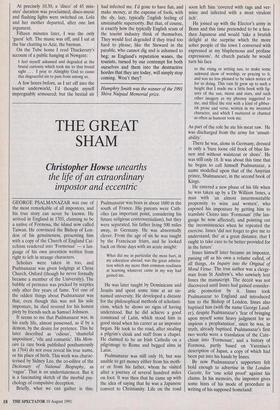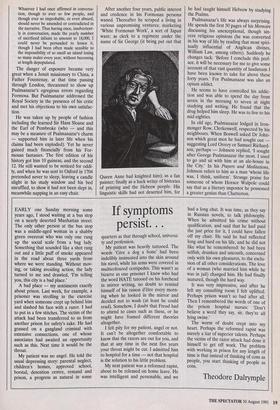THE GREAT SHAM
Christopher Howse unearths
the life of an extraordinary impostor and eccentric
GEORGE PSALMANAZAR was one of the most remarkable of all impostors, and his true story can never be known. He arrived in England in 1703, claiming to be a native of Formosa, the island now called Taiwan. He convinced the Bishop of Lon- don of his genuineness, presenting him with a copy of the Church of England Cat- echism rendered into 'Formosan' — a lan- guage of his own invention written from right to left in strange characters.
Scholars were taken in too, and Psalmanazar was given lodgings at Christ Church, Oxford (though he never formally became a member of the University). The bubble of pretence was pricked by sceptics only after five years of fame. Yet one of the oddest things about Psalmanazar was that, even though this was not his sole imposture, he died revered for his honest piety by friends such as Samuel Johnson.
It seems to me that Psalmanazar was, in his early life, almost possessed, as if by a demon, by the desire for pretence. This he later described as 'odious', 'shameful imposition', 'vile and romantic'. His Mem- oirs (a rare book published posthumously in 1764) do not even reveal his true name, or his place of birth. This work was charac- terised by Sidney Lee, the co-editor of the Dictionary of National Biography, as `vague'. That is an understatement. But it is a fascinating sketch of the morbid psy- chology of compulsive deception.
Briefly, what we can gather is this: Psalmanazar was born in about 1680 in the south of France. His parents were Cath- olics (an important point, considering his future religious controversialism), but they were separated, his father living 500 miles away, in Germany. He was abnormally clever. From the age of six he was taught by the Franciscan friars, and he looked back on those days with an acute insight:
What did me in particular the most hurt, in my education abroad, was the great admira- tion which my more than common readiness at learning whatever came in my way had gained me.
He was later taught by Dominicans and Jesuits and spent some time at an un- named university. He developed a distaste for the philosophical methods of scholasti- cism, which he shows no signs of having understood. But he did achieve a good command of Latin, which stood him in good stead when his career as an impostor began. He took to the road, after stealing a pilgrim's cloak and staff from a chapel. He claimed to be an Irish Catholic on a pilgrimage to Rome and begged alms in Latin.
Psalmanazar was still only 16, but was unable to get money either from his moth- er or from his father, whom he visited after a journey of several hundred miles on foot. It was then that he came up with the idea of saying that he was a Japanese convert to Christianity. Life on the road soon left him 'covered with rags and ver- mine and infected with a most virulent itch'.
He joined up with the Elector's army in Bonn and this time pretended to be a hea- then Japanese and would 'take a brutish delight at the surprise which the more sober people of the town I conversed with expressed at my blaphemous and profane expressions'. At church parade he would turn his face to the rising or setting sun, to make some aukward show of worship, or praying to it, and was no less pleased to be taken notice of for so doing. This vain fit grew up to such a height that I made me a little book with fig- ures of the sun, moon and stars, and such other imagery as my phrensy suggested to me, and filled the rest with a kind of gibber- ish prose and verse, written in my invented character, and which I muttered or chanted
• as often as humour took me.
As part of the role he ate his meat raw. He was discharged from the army for 'unsuit- ability'.
There he was, alone in Germany, dressed in only a 'bare loose old frock of blue lin- nen and without waistcoat or shoes'. He was still only 18. It was about this time that he began to call himself Psalmanazar, a name modelled upon that of the Assyrian prince, Shalmaneser, in the second book of Kings.
He entered a new phase of his life when he was taken up by a Dr William Innes, a man with 'an almost insurmountable propensity to wine and women', who exposed his imposture by getting him to translate Cicero into 'Formosan' (the lan- guage he now affected), and pointing out the inconsistencies when he repeated the exercise. Innes 'did not forget to give me to understand, tho' at a great distance, that I ought to take care to be better provided for in the future'.
Innes himself later became an impostor, passing off as his own a volume called, of all things, An Inquiry into the Original of Moral Virtue. The true author was a clergy- man from St Andrew's, who unwisely lent Innes the manuscript. The deceit was not discovered until Innes had gained consider- able promotion by it. Innes took Psalmanazar to England and introduced him to the Bishop of London. Innes also baptised him (with the name George Laud- er), despite Psalmanazar's 'fear of bringing upon myself some heavy judgment for so impious a prophanation', since he was, in truth, already baptised. Psalmanazar's first two works were a translation of the Cate- chism into 'Formosan', and a history of Formosa, partly based on Varenius's description of Japan, a copy of which had been put into his hands by Innes.
By now Psalmanazar's supporters felt bold enough to advertise in the London Gazette, for 'one solid proof' against his claims. In his memoirs, the impostor gives some hints of his mode of procedure in writing of his supposed homeland:
Whatever I had once affirmed in conversa- tion, though to ever so few people, and though ever so improbable, or even absurd, should never be amended or contradicted in the narrative. Thus having once, inadvertent- ly in conversation, made the yearly number of sacrificed infants to amount to 18,000, I could never be persuaded to lessen it, though I had been often made sensible to the impossibility of so small an island losing so many males every year, without becoming at length depopulated.
The danger of exposure became very great when a Jesuit missionary to China, a Father Fountenay, at that time passing through London, threatened to show up Psalmanazar's egregious errors regarding Formosa. But Psalmanazar addressed the Royal Society in the presence of his critic and met his objections to his own satisfac- tion.
He was taken up by people of fashion including the learned Sir Hans Sloane and the Earl of Pembroke (who — and this may be a measure of Psalmanazar's charm — supported him in later life when his claims had been exploded). Yet he never gained much financially from his For- mosan fantasies. The first edition of his history got him 10 guineas, and the second 12. He still wanted to be noticed for oddi- ty, and when he was sent to Oxford in 1704 pretended never to sleep, leaving a candle alight in his study window and his bed unruffled, to show it had not been slept in, meanwhile napping in an easy chair. After another four years, public interest and credence in his Formosan persona waned. Thereafter he scraped a living in various unpromising ventures: marketing `White Formosan Work', a sort of Japan ware; as clerk to a regiment under the name of Sir George (it being put out that Queen Anne had knighted him); as a fan painter; finally as a hack writer of histories of printing and the Hebrew people. His linguistic skills had not deserted him, for he had taught himself Hebrew by studying the Psalms.
Psalmanazar's life was always surprising. He spends the first 50 pages of his Memoirs discussing his unexceptional, though sin- cere religious opinions (he was converted in his way of life by reading that most spiri- tually influential of Anglican divines, William Law, among others). Suddenly he changes tack: 'Before I conclude this pref- ace, it will be necessary for me to give some account of that vast quantity of laudanum I have been known to take for above these forty years.' For Psalmanazar was also an opium addict.
He seems to have controlled his addic- tion and was able to spend the day from seven in the morning to seven at night studying and writing. He found that the drug helped him sleep. He was to live to his mid eighties.
In old age, Psalmanazar lodged in Iron- monger Row, Clerkenwell, respected by his neighbours. When Boswell asked Dr John- son which great men he had sought out suggesting Lord Orrery or Samuel Richard- son, perhaps — Johnson replied, 'I sought after George Psalmanazar the most. I used to go and sit with him at an ale-house in the City.' In his Prayers and Meditations, Johnson refers to him as a man 'whose life was, I think, uniform'. Strange praise for someone of whom Horace Walpole could say that as a literary impostor he possessed a greater genius than Chatterton.



















































 Previous page
Previous page